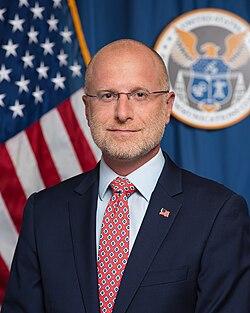Brendan Carr: Steering the Future of U.S. Telecommunications Policy
From Legal Expertise to FCC Leadership: Brendan Carr’s Professional Journey
Brendan Carr’s ascent to the helm of the Federal Communications Commission (FCC) is rooted in a robust combination of legal acumen and a profound grasp of telecommunications policy. Prior to his FCC appointment, Carr cultivated his expertise across both governmental and private sectors, focusing on the regulatory frameworks that govern America’s digital infrastructure. Notably, his tenure as Senior Counsel for the Senate Commerce Committee saw him advising on critical issues such as broadband deployment and spectrum management, underscoring his longstanding dedication to enhancing nationwide connectivity.
Throughout his career, Carr has been recognized for championing technological progress while carefully balancing the interests of industry stakeholders and the public. His FCC leadership is guided by a strategic vision centered on several core principles:
- Fostering competitive markets to benefit consumers through lower prices and improved services
- Boosting infrastructure investments, particularly targeting underserved rural and urban communities
- Advancing next-generation technologies like 5G and expanded broadband networks
- Providing clear regulatory frameworks to support evolving digital markets and innovation
| Period | Position | Area of Focus | Contribution |
|---|---|---|---|
| 2003–2010 | Legislative Counsel, Senate Commerce Committee | Telecommunications Policy | Shaped broadband expansion legislation |
| 2011–2016 | Partner, Law Firm | Regulatory Compliance | Advised telecom clients on FCC regulations |
| 2017–Present | FCC Commissioner and Chair | Connectivity & Innovation | Led initiatives on 5G rollout and infrastructure advancement |
Strategic Policy Initiatives Under Carr’s FCC Leadership
At the core of Brendan Carr’s FCC agenda lies a commitment to modernizing telecommunications infrastructure and expanding broadband access, especially in regions historically left behind. His market-oriented approach aims to stimulate private sector investment, ensuring the U.S.remains a global leader in digital innovation. This includes accelerating the nationwide deployment of 5G networks and fostering emerging technologies, all while avoiding regulatory overreach that could hinder progress.
Another pillar of Carr’s policy framework is the protection of an open internet, balanced with robust digital privacy and security measures. His management seeks to establish clear, consistent regulations that empower consumers and maintain fair competition without imposing undue burdens on service providers.Key policy highlights include:
- Safeguarding free expression on digital platforms with minimal government intervention
- Enhancing cybersecurity standards to protect critical communications infrastructure
- Reducing regulatory complexity to facilitate telecom innovation and growth
- Promoting competitive markets to drive down costs and improve service quality
Transformative Effects of Carr’s FCC Decisions on the Telecom Sector
Brendan Carr’s leadership has brought significant shifts to the U.S. telecommunications industry, emphasizing deregulation as a catalyst for innovation and competition. While this approach has been praised for accelerating broadband expansion—particularly in rural areas—it has also sparked debate regarding consumer protections and net neutrality. Under Carr’s guidance, major carriers have expedited infrastructure projects, promising faster and more reliable internet access to a wider population.
Notable outcomes of Carr’s regulatory policies include:
- Easing media ownership restrictions, potentially reshaping market competition
- Streamlining permitting processes to fast-track 5G infrastructure development
- Facilitating spectrum auctions to enhance network capacity and efficiency
- Implementing tougher regulations against robocalls, reducing consumer complaints
| Policy Area | Industry Impact |
|---|---|
| Net Neutrality | Rolled back regulations, increasing ISP operational versatility |
| Rural Broadband | Expanded funding and incentives to close connectivity gaps |
| Robocall Enforcement | Stricter rules leading to a decline in unwanted calls |
Anticipated Directions for Carr’s FCC Agenda: What Industry Players Should Know
Looking ahead, telecommunications stakeholders can expect Brendan Carr to maintain a strong focus on expanding broadband reach and enhancing network dependability. His future initiatives will likely emphasize closing the digital divide, particularly in underserved rural and urban communities, thereby fostering economic development and technological innovation. Policies encouraging infrastructure investment and public-private collaborations will be central to accelerating 5G adoption while preserving a competitive marketplace.
Key focus areas moving forward include:
- Optimizing Spectrum Management: Simplifying spectrum auctions to maximize wireless technology deployment and efficiency.
- Strengthening Consumer Protections: Ensuring transparency and fairness to shield users from exploitative practices.
- Enhancing Cybersecurity: Bolstering the resilience of dialog networks against increasingly complex cyber threats.
| Focus Area | Projected Outcome | Benefit to Stakeholders |
|---|---|---|
| 5G Network Expansion | Broader, faster connectivity nationwide | Enhanced user experience and business innovation opportunities |
| Rural Broadband Investment | Reduced connectivity disparities | Greater market inclusion and customer base growth |
| Regulatory Oversight | Fair competition and increased transparency | Level playing field and strengthened consumer confidence |
Conclusion: Brendan Carr’s Enduring Influence on America’s Digital Future
As Brendan Carr continues to guide the FCC through a rapidly evolving telecommunications landscape, his leadership remains a critical factor for industry participants and consumers alike. A comprehensive understanding of his background, policy priorities, and regulatory philosophy is vital for navigating the future of U.S. communications. With ongoing challenges surrounding broadband accessibility, privacy, and technological innovation, Carr’s decisions will play a defining role in shaping the nation’s digital ecosystem for years ahead.








